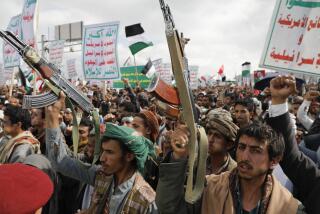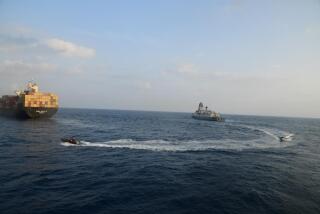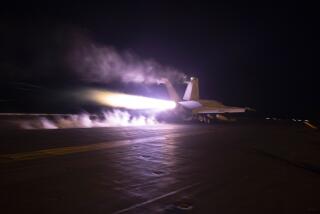Yemen president injured in attack on residential compound
A rocket fired into his residential compound during a prayer service Friday slightly wounded Yemen’s president, killed four others and appeared to end hopes for a peaceful resolution to a tribal conflict that is plunging the capital into chaos and pushing the country toward civil war.
Sana has been convulsed by nearly two weeks of fighting between President Ali Abdullah Saleh and the powerful Ahmar brothers, who head the president’s Hashid tribal confederation. The troubles escalated on Friday when Saleh’s forces shelled the home of one of the Ahmar brothers, Hamid, who is a politician and wealthy businessman.
Saleh’s compound was then struck, with a rocket hitting the mosque while Saleh was there praying. Fighters loyal to the Ahmars were most likely responsible, but the family denied that, contending that Saleh had organized the attack himself as a pretext for cracking down on his enemies.
Afterward, both sides seemed determined to continue fighting, regardless of the damage it causes the country.
Yemeni political analyst Abdul-Ghani Iryani said that the day’s events may show Saleh that he cannot attack the Ahmar family with impunity and expect to make peace. “His second option, which he will most likely carry out, is that he will exact as much revenge as possible on the Ahmar family in an attempt to destroy them.”
A fight to the death between Saleh, who has been in power nearly 33 years, and the Ahmars would probably be disastrous for Yemen, a country already taxed by separatist threats and the presence of Al Qaeda offshoots. Yemen has witnessed two civil wars in the last 41 years, and two of Saleh’s predecessors were assassinated. But analysts say the current threats are new and dangerous.
“This is uncharted territory. Yemen has had previous civil wars, but there is no good road map for how this will play out,” said Greg Johnsen, a former Fulbright fellow in Yemen and doctoral candidate in Near Eastern studies at Princeton University.
Deputy Information Minister Abdu Janadi said Saleh, who has not been seen since the shelling, suffered slight injuries while his three bodyguards were killed and several officials and officers were wounded. State television reported that the mosque’s prayer leader also died in the attack.
Saleh “has some scratches, and he will be healed soon,” said Janadi. “Nothing affects his health.”
“This assault didn’t respect the president, and didn’t respect the mosque. Maybe it is the right of the opposition to oppose the president … but to target the president of the republic with a group of worshipers?” he said.
Janadi said that security forces had also retaken all the government buildings in Sana’s northern Hasaba district, where the Ahmar family’s main home is located, and where fighting first broke out May 20.
Saleh’s opponents blamed him for provoking the Ahmars.
“Ali Saleh was targeted because he targeted the Ahmar family with death. It was a big mistake,” opposition leader Hassan Zaid told Al Arabiya television. “[Saleh] knew that they have the ability to hit him. He knew that they have the capability to reach him.”
The explosion at Saleh’s residence could be heard across the city.
Tens of thousands of antigovernment protesters gathered on the west side of Sana for Friday prayers and the mass funeral of 50 tribal fighters killed in the last four days of street battles. Demonstrators watching from the hillside cheered and shouted as they watched plumes of black smoke fill the sky in the southern district of the city, home to the presidential palace.
Antigovernment protesters danced and cheered in the streets to celebrate initial reports that Saleh had been killed. “Have you heard the good news?” said one as he ran through the tented sit-in in the west of the capital. “Ali Abdullah Saleh is dead,” he said as he raised his hands to the sky.
Ibrahim Shimari, who was helping carry the body of a dead fighter in the funeral procession, said it was too late to reach a peaceful solution. He said he intended to join the tribal fighters trying to oust the president.
“It’s the only way to get rid of Saleh,” Shimari said.
In Saleh’s neighborhood, fire from automatic weapons and rocket-propelled grenades broke out after the blasts, just as crowds began gathering for lunch, sending them fleeing frantically in all directions in their SUVs. Shells rained down from surrounding mountains.
At nightfall, Sana fell into an eerie quiet as men with sticks guarded their neighborhoods and some conducted motorcycle patrols. People feared anarchy and waited for Saleh’s next move.
“Saleh has warned that if he leaves there will be war and chaos,” said Johnsen. “He appears to be trying to make this a self-fulfilling prophecy.”
Special correspondents Craig and Boone reported from Sana and Times staff writer Parker from Baghdad. Raheem Salman of The Times’ Baghdad bureau contributed to this report.
More to Read
Start your day right
Sign up for Essential California for news, features and recommendations from the L.A. Times and beyond in your inbox six days a week.
You may occasionally receive promotional content from the Los Angeles Times.






